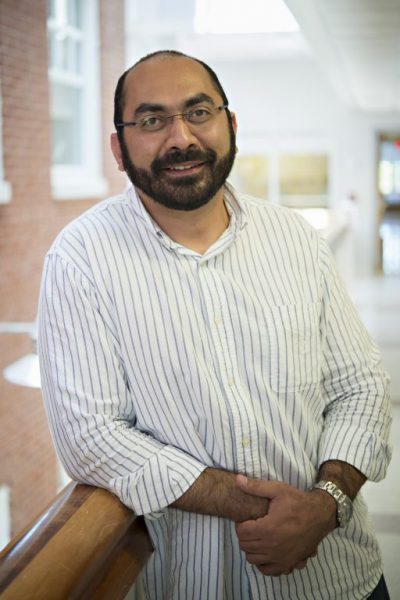Turning Data into Knowledge Moataz Khalifa discusses his new job as Leyburn Library's director of data education.
“The quote ‘We are drowning in information but starved for knowledge’ by John Naisbitt is a big motivator for me to learn—and help others learn—more about how to turn data into knowledge.”
Q: What will be your responsibilities as the library’s new director of data education?
The responsibilities for this new position are truly exciting and diverse. They include:
• Designing and teaching courses about data science and data analytics
• Teaching modules within already existing courses that depend on data science
• Assisting faculty members and students with research projects that require data analysis
• Helping in developing a peer tutoring program for students who are involved in data intensive research
Q: What drew you to this position?
The quote “We are drowning in information but starved for knowledge” by John Naisbitt is a big motivator for me to learn—and help others learn—more about how to turn data into knowledge. We
live in a world where we are constantly bombarded by large amounts of data, information, statistics, facts and opinions disguised as facts, all of which help shape the public awareness in many ways. The ability to deal with large datasets, the knowledge of how such data is processed, and the understanding of weaknesses and strengths in every data processing technique demystifies results that are normally used to shape opinions on a public and private level.
Q: How will your disciplinary expertise in physics inform your new work?
First of all, I am a strong believer in the benefits of true interdisciplinarity in research. Second of all, every physicist by training has to take a healthy dose of advanced statistics and learn data analysis. One of my most successful collaborations so far is the one in which I was the physicist responsible for building a computational statistical model to help transmission electron microscopists improve the reliability and preciseness of the data extracted from the electron energy dissipation spectrographs.
Third of all, coming from the natural sciences side of the fence, I am keenly aware of the complexity of attempting to apply physical and mathematical models to experiments done in the social sciences.
Q: Why is data literacy important to today’s undergraduate students?
We live in a society in which political, economic and technological advancement depends on analyzing large amounts of data…which keeps getting larger. For students who don’t intend to major in fields that depend on data analysis, learning the fundamentals of data science and analytics will help in shaping the well-rounded education they are receiving here at Washington and Lee. For students who are majoring, or intending to major, in fields that rely heavily on data, such as economics, business or any of the natural sciences, to name a few, data literacy is extremely important for obvious reasons.
This article originally ran in FOLIOS, the library newsletter.
If you know any W&L faculty who would be great profile subjects, tell us about them! Nominate them for a web profile.
More about Dr. Khalifa
EDUCATION:
• B.S. in Physics, American University in Cairo
• Diploma of Science, American University in Cairo
• M.S. in Physics, Virginia Tech
• Ph.D. in Physics, Virginia Tech
TEACHING EXPERIENCE:
• Visiting Assistant Professor of Physics, W&L, 2015-2018
RESEARCH INTERESTS:
• Nanotechnology
• Nanolithography using atomic force microscopes
• Electron Energy Loss Spectroscopy (EELS) quantitative models for transmission electron
microscopes
• Density functional theory
 Moataz Khalifa
Moataz Khalifa
You must be logged in to post a comment.